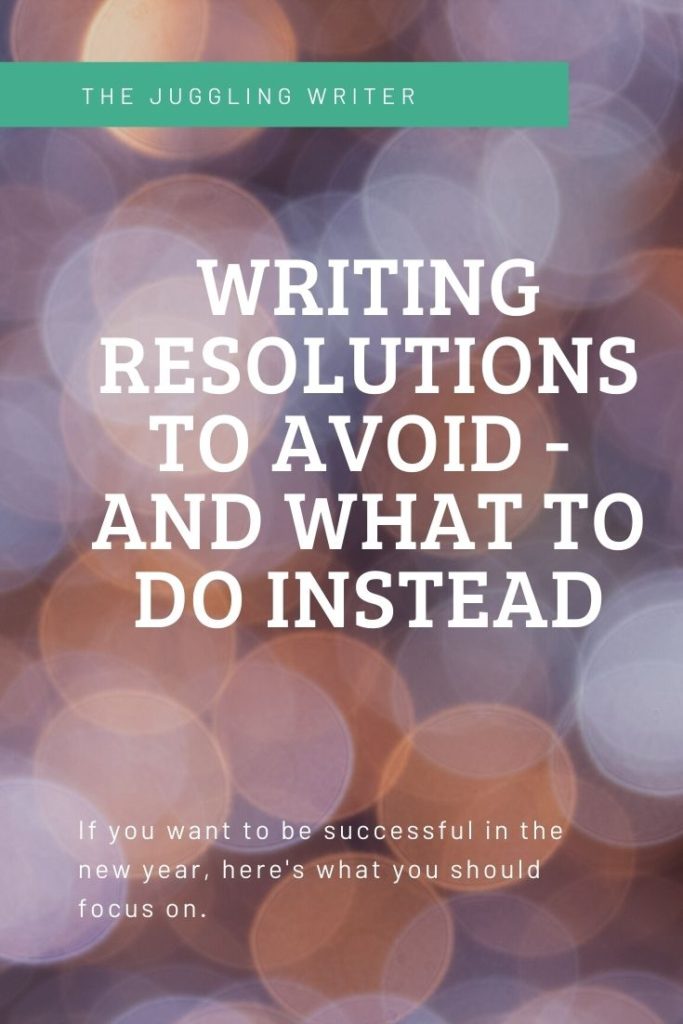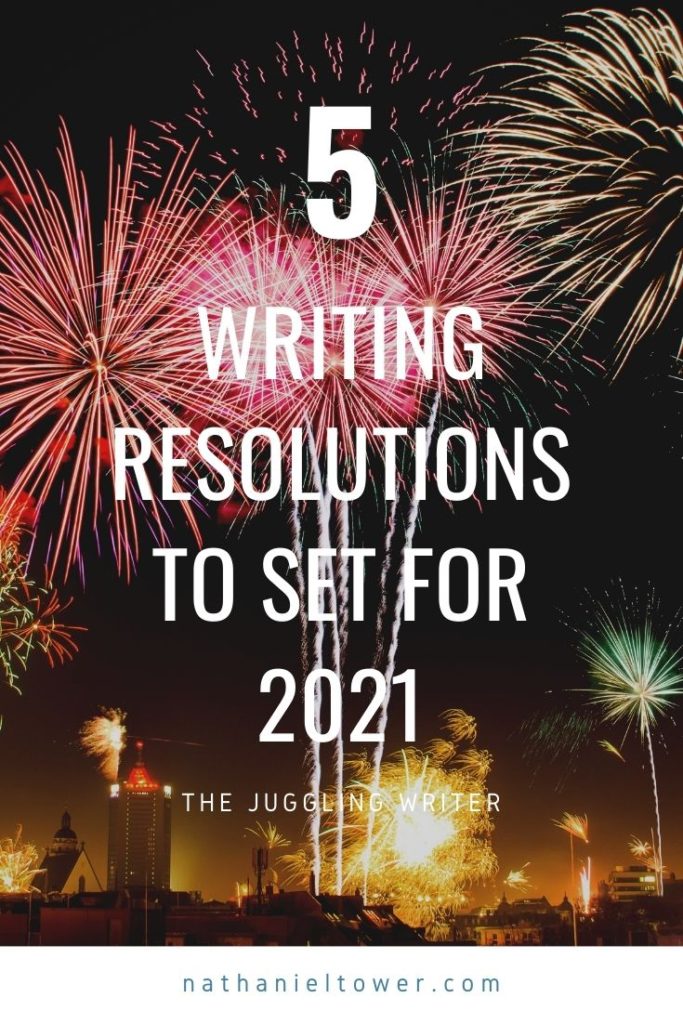Last Updated on December 23, 2020 by Nathaniel Tower
Popular opinion seems to suggest that 2020 was the worst year ever. While there were certainly a lot of really bad things that happened (no, I’m not going to get into the details), I hope you saw some writing success during the year.
But before we rush into 2021 and assume everything is going to be magically better, let’s pause and do what we should do as writers every year.
Yes, it’s that time of year again. Writers everywhere reflect on what they’ve accomplished in the past 12 months and begin to set their goals for the next 12. As you finish calculating your total word count and acceptance ratio from 2020, here are some things to think about for the next year.
It’s obviously important to have some writing goals. If you just sit at a computer once in awhile and pound on your keyboard until something that looks like a story, poem, or novel appears on the screen, then you aren’t really a writer. You need to have some type of direction or plan if you ever want to get something accomplished. However, many of the writing “resolutions” we set for ourselves simply don’t work for us.
Our society is obsessed with setting resolutions for the upcoming year. It’s a chance to start over and become better versions of ourselves. Lose weight, work harder, eat better, be nicer, spend more time with the family, etc. However, the vast majority of resolutions are broken or forgotten by March. While writers may be a little more dedicated than the average folk, we still tend to place ourselves in positions to fail each year.
But this year is different. This year, you’re not going to fail as a writer. Here are 5 writing resolutions you should avoid in 2021 and what you should do instead.
Writing resolutions to avoid in 2021
1. I’m going to write X number of words per day.
In theory, this is a great resolution. It ensures you will write something every day. Writing every day is a good thing. It keeps you in the habit of writing and promotes the flow of ideas. But choosing to write 500 or 1,000 words every single day doesn’t necessarily accomplish anything and can actually be counterproductive. There will inevitably be days when you don’t have enough time to knock out that number of words. Other days, those 1,000 words will be so terrible you’ll wonder if you should quit being a writer. The truth is, you don’t have to write every day at all.
What to do instead:
Instead of shooting for a certain number of words every day, try setting aside a certain amount of time every day. If you must write something every day (truthfully, I don’t think it’s that important—you aren’t going to forget how to write if you take a day or two off, and sometimes a day off from writing is refreshing and can lead to more productivity the next day), then a better resolution is “I’m going to write for at least X minutes per day.” Or better yet, have a set amount of time dedicated to writing-related pursuits each day. If there’s a day you really don’t feel like writing, you can spend your allotted time submitting your work, editing an old story, or researching new publication opportunities. This will often be more productive than hammering out 1,000 words of gibberish.
2. I’m going to land a big book deal.
The worst resolutions you can possibly set are the ones you have no control over. If your writing resolution for 2021 is to get a big book deal, then you are setting yourself up for colossal failure. No matter how good your novel is, you don’t have ultimate control over whether or not this will happen. That doesn’t mean you shouldn’t try to land a big book deal. It just means you need to put your focus on other areas.
What to do instead:
If a big book deal is really what you want, you need to have a plan for making it happen. You can’t just blindly go into a new year with the mindset that you’ll be a rich writer within the next 12 months. What steps can you take to get closer to this goal? Make more writing connections. Find an agent. Do more research about the big publishing houses and what they really want. Ask for advice from people who have landed a big book deal (you must know at least one from that massive list of Facebook friends you’ve never met). And read a lot more current fiction/non-fiction/whatever genre you are looking to crack.
3. I’m going to submit my work more often.
A few years ago, I decided I would submit at least one story per day. At the end of the year, I amassed over 500 total submissions—and a boatload of rejections. As you can imagine, my acceptance rate was pretty low. Yes, I did end up with a personal record number of published pieces. I also wasted a lot of my time (and a lot of time of editors). Submitting more often isn’t necessarily a bad thing, but you need to be sure you go about it the right way.
What to do instead:
Instead of just submitting more, do more research and submit to more appropriate venues. Don’t just throw your work out there to every publication you can find. Do your homework and pick the venues and publishers that are a good fit for your work. Look for publication opportunities that will help you achieve your larger goals as a writer. Are you looking for exposure? Publication credits? Compensation? Know what you want to accomplish and send out your work accordingly. Never send your work out to a publisher that doesn’t line up with what you want. And never send work to a publisher without having a good sense of what they want.
4. I’m going to finish my work-in-progress.
This sounds like a great resolution, and it’s one I’ve set for myself the past seven years. Moving into 2021, I still haven’t finished that particular work-in-progress. Why not? After all, I set the goal. The book should be finished by now. There are a combination of factors that have prevented me from finishing it, and this isn’t a bad thing. In fact, the end result is going to be a much stronger novel. Setting a deadline for our writing can be great, but it can also be damning for the piece of work as a whole. If you rush to finish something by the end of the year just to meet that goal, you might end up with a finished product that isn’t as good as it could be.
What to do instead:
Instead of definitively deciding your novel must be finished by a certain date, give yourself a timeline to work on different aspects of the book. For example, you might say your goal is to finish a rough draft by the end of March and your first round of edits by June. But be flexible. Novels are living things. They can change drastically over the course of a few months, and they often don’t go according to your initial plan. Unless you are on a firm deadline to finish (as in a deadline set by a publisher), then there’s no need to rush to get it done by a certain date. Give yourself the time to work on it, but don’t force it into conclusion by December 31st. Sometimes it’s better to start the book over than to put the final period in place and start sending it out.
5. I’m going to sell a ton of copies of my book.
Yes, we all want the upcoming year to be the year we get on the bestseller list. Fortunately, we do have some power over book sales. Through advertising and marketing, we have the ability to influence others to buy our books. However, saying you want to sell a lot of books is a lousy resolution. It’s akin to saying you are going to lose a bunch of weight. You can cut out a bowl of ice cream once a week or decide to post “Buy my book” on Facebook every day, but this doesn’t mean you’ll have a chiseled body or crack the top ten on Amazon.
What to do instead:
Develop a marketing strategy. Instead of saying you want to sell a lot of books, come up with a realistic number of books you want to sell and figure out how to sell them. Set quarterly sales goals so you can track your progress and reassess your strategy every few months. Keep in mind though that a number of sales is your desired result, not your resolution. If you want to push a certain quantity of your book, then you need to make goals that will help you sell. The problem with just saying you will sell 1,000 books a month or lose 15 pounds is that these results ultimately aren’t in your control. You can have an exercise and diet plan and follow it perfectly, but if you step on the scale and have only lost 13 pounds, are you a failure? Similarly, if you do your blog tour, readings, interviews, promoted posts, book trailers, and everything else according to your plan, are you a failure if your book sells 994 copies? Or even 750 copies? No, because you acted according to plan and did what you set out to do.
Final thoughts on writing resolutions
There’s nothing wrong with wanting to increase your output, get a big book deal, land more publications, finish your manuscript, or become a bestseller. However, in order to accomplish these things, you need to establish resolutions that will get you there. What works for one writer may not work for you. Remember, this is a pretty subjective industry. Sometimes, all you can do is try your best. Just make sure you have a plan in place that will allow you to do just that.
What are your writing goals and resolutions for 2021? Share what works for you and what doesn’t in the comments.



My goal (from the last few years as well) for 2019 is to relearn the joy of making up stories. I haven’t been able to lose myself in the story creation and/or writing process in a meaningful way in years. I let myself get distracted by all the “shoulds” and “don’ts” and “when I was being published…” thoughts instead of just focusing on telling the story.
Kaye, that is a fantastic goal for 2019! I wish you the best of luck and look forward to reading your work.
I think you could write an entire post on just three words from this post: Find an agent.